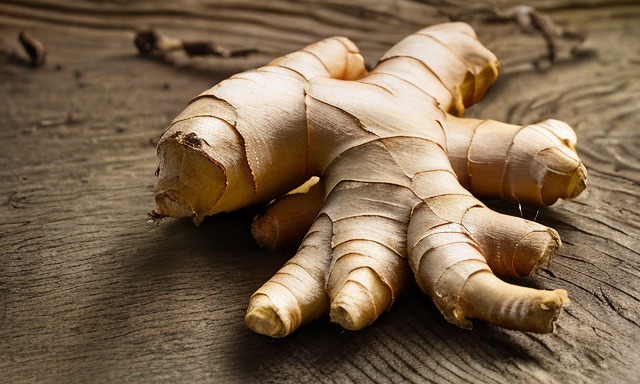Internet Asks: “Is Ginger Acidic?”
When it comes to adding a little zest to your culinary adventures, ginger takes center stage. This versatile spice is known for its distinctive flavor and aromatic properties, making it a popular ingredient in cuisines around the world. But have you ever wondered whether ginger is acidic or alkaline? Today, we're peeling back the layers to uncover the truth about ginger's acidity and explore why it's a spicy addition to your palate. So grab your ginger root and let's embark on a flavorful journey!
sponsored links

The Ginger Phenomenon
Before we unveil the acidity of ginger, let's take a moment to appreciate the phenomenon that is ginger. From its exotic origins to its unique flavor profile, ginger has captured the hearts and taste buds of food enthusiasts everywhere. Here are a few reasons why ginger deserves the spotlight:
- - Distinctive Flavor: Ginger boasts a warm, spicy, and slightly sweet flavor that can add depth and complexity to a wide range of dishes, from stir-fries to baked goods. Its aromatic qualities lend a tantalizing aroma that can awaken the senses.
- - Culinary Versatility: Ginger is a versatile spice that can be used fresh, dried, powdered, or even in the form of ginger oil. It plays well with both sweet and savory dishes, making it a beloved ingredient in cuisines across the globe.
- - Digestive Champion: Ginger has long been revered for its potential digestive benefits. It is often used to alleviate nausea, soothe an upset stomach, and promote healthy digestion.
- - Nutritional Powerhouse: Ginger is rich in antioxidants and contains beneficial compounds such as gingerol, which has been studied for its potential anti-inflammatory and immune-boosting properties.
Acidity or Alkalinity: Ginger's True Nature
Now, let's address the burning question: Is ginger acidic or alkaline? The answer might surprise you. While ginger has a spicy kick that might suggest acidity, it is actually alkaline in nature. In fact, ginger is known for its alkalizing properties, which means it has the ability to help balance the body's pH levels. While ginger does contain some organic acids, such as gingerol and shogaol, its overall mineral composition and alkalizing effect outweigh the acidity of these organic acids.
Although ginger is alkaline, it's important to note that taste perception can vary among individuals. Some people may experience a slight burning sensation or acidity when consuming ginger in large quantities or if they have certain sensitivities. However, this sensation is not a reflection of the actual acidity of ginger but rather a subjective experience.
sponsored links
The Health Benefits of Ginger
Aside from its unique flavor and alkalizing nature, ginger offers a range of potential health benefits:
- - Digestive Support: Ginger has been traditionally used to aid digestion and alleviate gastrointestinal discomfort. It may help reduce nausea, bloating, and indigestion.
- - Anti-Inflammatory Properties: Ginger contains gingerol, a compound that has been studied for its potential anti-inflammatory effects. It may help reduce inflammation in the body and support overall well-being.
- - Immune Boost: Ginger is packed with antioxidants, which can help strengthen the immune system and protect against oxidative stress.
- - Soothing Properties: Ginger has a calming effect on the body and may help promote relaxation and ease muscle discomfort.
Incorporating Ginger into Your Culinary Adventures
Ready to spice up your life with some ginger-infused goodness? Here are a few creative ways to incorporate ginger into your culinary adventures:
- 1. Stir-Fry Sensations: Add freshly grated or minced ginger to your stir-fries for a burst of flavor and aromatic goodness. It pairs well with vegetables, meats, and seafood, creating a harmonious blend of tastes.
- 2. Aromatic Teas: Brew a soothing cup of ginger tea by steeping freshly grated ginger in hot water. Add a squeeze of lemon and a drizzle of honey for an invigorating and comforting beverage.
- 3. Sweet Treats: Ginger adds a delightful twist to sweet treats like cookies, cakes, and desserts. Try adding ground ginger or grated ginger to your favorite recipes for a spicy and aromatic kick.
- 4. Infused Beverages: Create refreshing and invigorating infused beverages by combining ginger with fruits, herbs, and sparkling water. Experiment with different flavor combinations for a truly unique and revitalizing drink.
The Bottom Line
Ginger, with its zesty flavor and alkaline nature, is a captivating spice that can elevate your culinary creations and potentially offer some health benefits. Whether you're a fan of its distinctive taste or appreciate its potential digestive support, ginger is a versatile ingredient worth exploring in your culinary adventures. Embrace the spice, experiment with flavors, and savor the zesty goodness that ginger brings to the table.
Disclaimer: The information provided in this article is for educational and informational purposes only. It is not intended as a substitute for professional medical advice, diagnosis, or treatment. The use of ginger or any other food product should be based on individual tolerance, allergies, and dietary considerations.
References
- 1. Harvard Health Publishing. Gastroesophageal Reflux Disease (GERD).https://health.harvard.edu/a_to_z/gastroesophageal-reflux-disease-gerd-a-to-z
- 2. Trustees of the University of Pennsylvania. Ginger: Health Benefits and Dietary Recommendations During Cancer Treatment. https://www.oncolink.org/support/nutrition-and-cancer/during-and-after-treatment/ginger-health-benefits-and-dietary-recommendations-during-cancer-treatment
- 3. National Library of Medicine. The Effectiveness of Ginger in the Prevention of Nausea and Vomiting during Pregnancy and Chemotherapy. https://www.ncbi.nlm.nih.gov/pmc/articles/PMC4818021/
- 4. Food Insight. A “Basic” Examination of the Alkaline Diet. https://foodinsight.org/a-basic-examination-of-the-alkaline-diet/
Updated June 2024: Stay informed with the latest updates by checking back on our blog for more detailed and current information.
People are also reading...
🌯 Burritos Calories?
🫐 Are Blueberries Acidic?
🥭 Are Mangoes Acidic?
People are also reading...
Does Sprite Have Caffeine?
Calories In Steak?
Chicken Taco Calories?
Does Hot Chocolate Have Caffeine?
Are Carrots Acidic?
Are Mangoes Acidic?
Orange Juice pH?
Does Kahlua Have Caffeine?
Calories In a Grilled Cheese?
Is Watermelon Acidic?
6 oz Steak Calories?
Are Strawberries Acidic?
Ready to level-up?
Create meal plans 10x faster, follow up with your clients through our mobile app, and never struggle with meal planning or recipe management again.